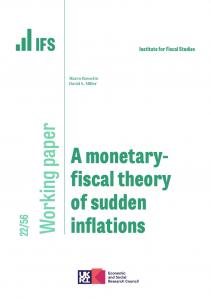- In 1997, the government promised to abide by two fiscal rules that constrain how much it borrows and to what purpose. It claims to have met them over an economic cycle running from 1997 to 2006, but they had already lost credibility as a meaningful constraint on policy prior to the current crisis.
- Having overachieved the golden rule by delivering an average current budget surplus of £2 billion a year over the last economic cycle, Labour now expects an average current budget deficit of £37 billion a year over the next. This would be a much larger average deficit than in either of the two cycles under the previous Conservative government.
- The headline measure of public sector net debt could rise to around 170% of national income now that RBS is to be treated as a public corporation - or to around 240% if Lloyds Banking Group is treated similarly. But whether these investments will increase or reduce debt in the long term remains uncertain.
- Given the scale of the shock to the public finances resulting from the credit crunch, the government has sensibly decided to suspend the rules rather than taking the draconian decisions necessary to adhere to them.
- The government's 'temporary operating rule' offers it considerable flexibility in setting fiscal policy, but it may not be seen as much of a constraint on tax and spending decisions. In practice, the verdict of the financial markets may be the main constraint and the government's loss of credibility in the past may make a rise in its borrowing costs more likely.
- The government should consider adopting a target for future debt servicing costs and other commitments imposed on future taxpayers, rather than the stock of public sector net debt. The government could also commit to overachieving the golden rule by an amount sufficient to 'pre-fund' any increase in public sector pension costs that its actions impose on future taxpayers.
- The government should consider creating a properly funded independent body, with access to all the information currently available to the Treasury, to prepare fiscal forecasts and recommend to the Chancellor what fiscal tightening or loosening would be consistent with meeting the fiscal rules.









